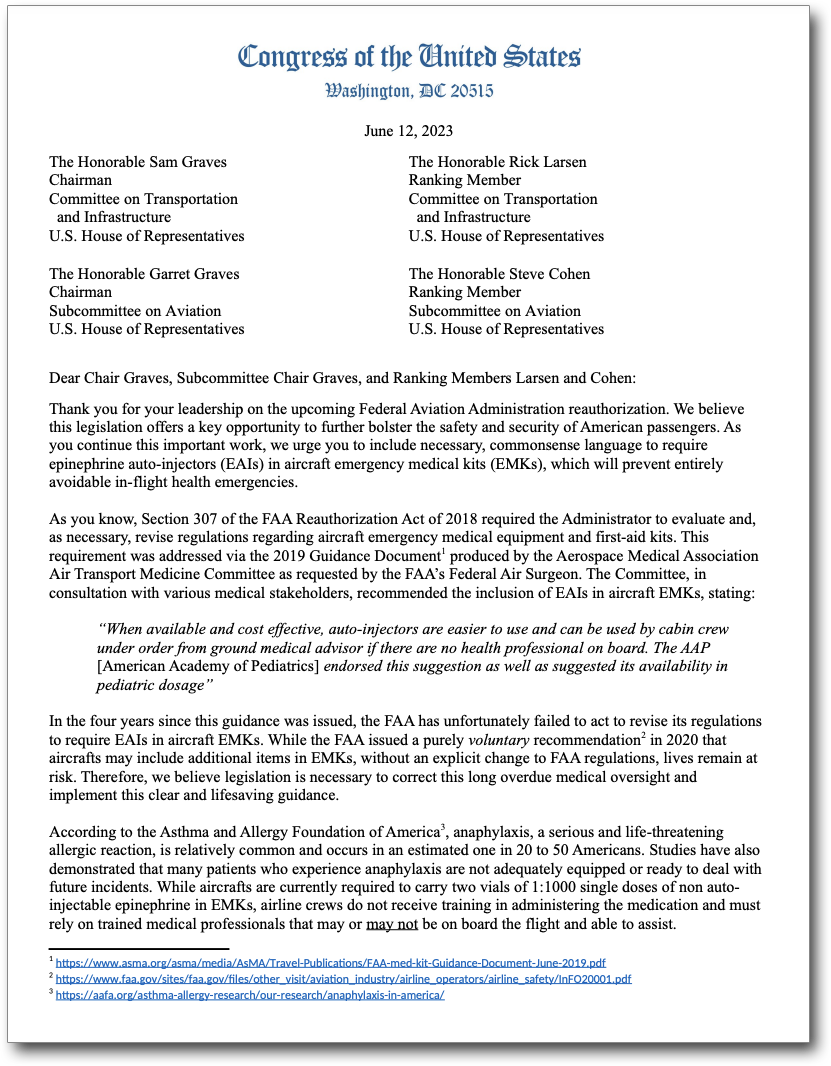Epinephrine is the only drug that can halt and reverse the progression of anaphylaxis, a serious, life-threatening allergic reaction to a food, drug, insect venom, or environmental substance, provided it is administered in a timely fashion. While epinephrine is normally carried in emergency medical kits aboard commercial flights, it is often in vial form that requires a trained medical professional to administer the drug via syringe.
That poses two problems. First, there is no guarantee a trained medical professional will be aboard any given flight, and finding that person, drawing the correct dose of the drug and administering it takes precious time during an anaphylactic emergency.
In April of this year, Dr Lindsey Ulin, a resident physician in the Department of Internal Medicine at Brigham and Women’s Hospital, was flying from Phoenix to Austin when she realized she was starting to feel the telltale signs of an anaphylactic reaction for the first time. Luckily, another doctor was on the flight and was able to administer epinephrine in time.
In an effort to remedy this situation, Representatives Chrissy Houlahan (D-PA) and David Valadao (R-CA) sent a letter to colleagues on the House Committee on Transportation and Infrastructure urging them to add provisions requiring airlines to carry epinephrine auto-injectors in their medical kits and review their contents on a periodic basis.
Here follows their press release describing the need in its entirety.
Reps Houlahan, Valadao Call for Allergy Emergency Safeguards on Commercial Flights
WASHINGTON, D.C. – Ahead of the Federal Aviation Administration (FAA) Reauthorization legislation markup, Representatives Chrissy Houlahan (D-PA) and David Valadao (R-CA) sent a letter to their colleagues on the House Committee on Transportation and Infrastructure urging them to include a provision requiring epinephrine auto-injectors, like EpiPens, in aircraft emergency medical kits. The bipartisan letter, addressed to House Transportation and Infrastructure Committee and Aviation Subcommittee leadership, also encourages the committee to include a provision requiring the FAA to review the contents of emergency medical kits on a regular basis.
“Anaphylaxis and severe allergic reactions can happen at any time and in an instant. We know the best way to immediately treat them when they occur are with epinephrine auto-injectors like EpiPens,” said Houlahan. “Including this life-saving measure on commercial flights is a commonsense decision to prevent in-flight health emergencies from happening.”
Today, during the FAA Reauthorization legislation markup, the Transportation and Infrastructure Committee passed an amendment requiring the FAA Administrator to review and update regulations regarding the contents of emergency medical kits and medical training required for flight crews within 12 months. The amendment, offered by Rep. Eleanor Norton (D-D.C.), also requires the FAA Administrator to consider the costs and benefits of including new medications in emergency medical kits and whether the contents of the kits include medications and equipment that can practicably be administered to address emergency medical needs of children and pregnant women, opioid overdoses, anaphylaxis, and cardiac arrest.
Houlahan continued: “It’s great that there will be a review and update of the contents in emergency medical kits and whether they can be practicably administered in flight. I’m hopeful the FAA Reauthorization will lead to the protection thousands of Americans by FAA using this mandated review to include auto-injectors on commercial flights.”
“Americans who suffer from severe allergies and are at risk of anaphylaxis deserve to have some peace of mind when traveling by plane. Ensuring airplanes have EpiPens on board and our airline crews are trained to administer these emergency medications is a measure that would without a doubt save lives,” said Valadao. “As the co-chair of the Congressional Allergy and Asthma Caucus, I’m proud to join my colleagues in calling for this bipartisan and commonsense reform to FAA regulations that will keep airline passengers safe.”
“The Asthma and Allergy Foundation of America applauds Representatives Houlahan and Valadao for initiating this bipartisan letter to ensure that every passenger aircraft emergency medical kit include epinephrine auto injectors, and we appreciate the 14 Representatives who co-signed the letter,” said Kenneth Mendez, president and CEO of the Asthma and Allergy Foundation of America.“On behalf of the 32 million Americans coping with food allergies, we encourage Congress to adopt commonsense language that will safeguard the lives of individuals who may experience anaphylaxis during a flight.”
Read the letter here:






